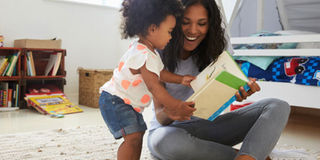Effective ways to train your toddler

The toddler stage is characterised by mood changes, temper tantrums and use of the word ‘no’. This behaviour, according to Dr Winifred Kisitu, a child development expert, is a normal stage of development.
“At around two years, children have an enormous explosion of brain development which comes with increased independence and personal preferences. However, they still have a limited understanding of what is going on around them and are challenged yet equally confused; leaving them frustrated or frightened,” Dr Kisitu explains.
It takes time
Kisitu adds that while children are ‘eager students’, learning will take some time to sink in. Therefore, as their main teachers, adults ought to reinforce boundaries with consistency, patience, and compassion.
While it is almost unavoidable to react when toddlers continually repeat the same misbehaviour, it is important that adults fight the urge to yell because their tone will either make the children more upset or rebellious.
She observers that toddlers are natural attention seekers who thrive off a reaction. However, to avoid this behaviour from thriving, parents ought to stay calm and neutral. Setting boundaries and being consistent in reinforcing them is especially important for toddlers for they learn right from wrong by constantly being reminded of the unwanted behaviour.
“If the dining table was off-limits yesterday, it should be off-limits today and parents need not worry about repeating themselves. “
Use simple language
Toddlers may need to hear something repeatedly before they get the message. Give a firm ‘no’ (making eye contact and getting on the child’s height level, by sitting or kneeling down) with a quick explanation such as ‘do not climb on to the table, you could get hurt’ and then redirect the child to a more desirable activity,” she advises.
The shorter and simpler the language used, the better. And because toddlers have short attention spans, they will be happy to move on.
Ms Mary Gilda Butamanya, a mother and counsellor at Daughters of Mary Training and Counselling Services adds that the way you communicate with children makes a difference. A touch is very vital at this stage. Those who are shown love, easily respond while those that are neglected or over punished develop rebellious tendencies.
“How you show them matters a lot. Traditionally, we use a slap, but it does not have to be the kind that invokes a cry.”
Reward good bahaviour
That is inasmuch as punishment helps them understand that when one does wrong, there is a repercussion. Withholding something from a child say, TV time is message enough for them to understand that what they did was not pleasing to you,” she explains.
That said, punishment and motivation is crucial in a child’s life but ought to be done in balance to raise a balanced child.
Butamanya advises that when they do something good, you ought to reward it. “That way, they will listen rather than rebel. However, when you only punish but never reward, they find no motivation to do good but rather avoid punishment. That is a sad way to raise a child,” Butamanya notes.
Reduce temptation
Dr Kisitu adds that parents also need to make it really possible for toddlers to do the right thing by avoiding ‘tempting’ situations.
“For example, do not put a table or fridge in an area that entices them to climb on top. Try to maximize their opportunities to play and explore but minimize their chances to get into trouble. If their world is cluttered with temptations, adults will spend a vast amount of time saying no or running after toddlers,” she adds.
Stick to schedule
Butamanya adds the need for order in their lives. For example, specific time for eating and sleeping. This brings order into their lives.
Continuing with the order, after a child has eaten, whether they are sleepy or not, put them to bed. They may cry but stick to it for in due time, they will adhere to the practice and fall in line.
Be a good example
Children learn more by seeing than when you talk to them; what you do is more important than words. If you need them to pick after themselves, yet you leave your up plate on the table after meals or throw your clothes about, they will just follow into your footsteps.
Butamanya says this shows that role modelling is very crucial in a child’s life. school may not be where you take them.
Family
Everyone in the home, be it a relative, house help, should be exemplary if you need the child to listen when told something.
“The way you talk to them must also vary,” she adds. For example, if a child did wrong, the tone is rather unpleasant while when they do well, the tone is warm and happy. They are able to pick up on those things which some of us may take for granted.
Ms Mary Gilda Butamanya, also advocates for exposing them to areas that will help in grooming. Such places include Sunday school where they are taught a myriad of virtues through say, Bible stories.
Another area is the schools you take them to right from kindergarten level. For example, if you want your child to display cultural mannerisms, then an International. You have to be intentional in this.




